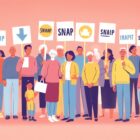Why Do SNAP Benefits Affect Social Standing?

Did you know that receiving SNAP benefits can have a significant impact on your social standing? It’s true.
Many individuals who rely on these benefits face stereotypes, prejudices, and social inequalities.
In this article, we will explore why SNAP benefits affect social standing, examining the perception of dependency, cultural and political factors, and the impact on self-esteem and mental health.
Understanding these dynamics is crucial in addressing the challenges faced by those who rely on SNAP benefits.
Key Takeaways
- Perception of dependency on SNAP benefits carries a negative connotation and can lead to stereotypes and prejudices.
- Economic inequality and limited opportunities contribute to the cycle of poverty and the need for SNAP benefits.
- Cultural and political factors, including media portrayals and political rhetoric, shape public attitudes towards SNAP recipients.
- Receiving SNAP benefits can negatively impact self-esteem, mental health, and social standing, leading to social isolation and exclusion.
The Perception of Dependency
Your perception of dependency may affect how you view others receiving SNAP benefits. The idea of dependency often carries a negative connotation, implying that individuals who rely on government assistance lack self-sufficiency or personal responsibility. This perception can shape attitudes towards those who receive SNAP benefits, potentially leading to judgments and stereotypes. However, it’s important to approach this topic from an objective standpoint, considering the research and evidence available.
Numerous studies have shown that the majority of individuals who receive SNAP benefits do so temporarily, as a result of unforeseen circumstances such as job loss, medical emergencies, or natural disasters. Contrary to popular belief, most recipients actively seek employment and strive to become financially independent. Research also indicates that SNAP benefits play a crucial role in reducing poverty and food insecurity, supporting recipients in their attempts to regain stability and self-sufficiency.
Understanding the complexities of poverty and the factors that contribute to individuals seeking SNAP benefits is essential in challenging biases and misconceptions. Rather than viewing recipients as dependent or lazy, it’s crucial to recognize the systemic issues that perpetuate poverty and create the need for assistance programs like SNAP. By addressing these underlying issues, society can work towards creating a more equitable and supportive environment for all individuals, regardless of their circumstances.
Stereotypes and Prejudices
Stereotypes and prejudices surrounding SNAP benefits can shape how individuals perceive and judge those who receive government assistance. These preconceived notions are often based on misinformation and perpetuated by societal biases. The negative stereotypes associated with SNAP recipients can lead to stigmatization, resulting in social isolation and diminished opportunities.
One prevalent stereotype is that individuals who rely on SNAP benefits are lazy or unwilling to work. This stereotype fails to acknowledge the complex factors that contribute to the need for government assistance, such as low wages or unemployment. Research shows that the majority of SNAP recipients are working individuals or families with children.
Another stereotype is that SNAP recipients are irresponsible with their money and use their benefits to purchase luxury items or non-essential goods. However, studies have consistently shown that SNAP benefits are primarily spent on essential items such as food and household necessities.
These stereotypes and prejudices can have far-reaching consequences for individuals receiving SNAP benefits. They may face discrimination when seeking employment or housing, and their self-esteem and mental well-being can be negatively impacted.
It is essential to challenge these stereotypes and prejudices through education and awareness. By promoting accurate information about SNAP benefits and advocating for empathy and understanding, we can help combat the harmful effects of these stereotypes and create a more inclusive society.
Social and Economic Inequality
How does social and economic inequality impact the perception of individuals receiving SNAP benefits?
Social and economic inequality plays a significant role in shaping the perception of individuals receiving SNAP benefits. Here are three ways in which this impact can be observed:
- Stereotyping: People from higher social and economic classes often hold negative stereotypes about those who rely on government assistance programs like SNAP. These stereotypes contribute to the stigmatization of SNAP recipients, leading to judgment and prejudice.
- Limited opportunities: Economic inequality can limit the opportunities available to individuals, making it difficult for them to break the cycle of poverty. This lack of opportunity is often perceived as a personal failing, further reinforcing negative perceptions of individuals receiving SNAP benefits.
- Power dynamics: Economic inequality is closely tied to power dynamics within society. Wealthier individuals have more influence and control over the narrative surrounding SNAP and other government assistance programs. This can shape public opinion and perpetuate negative perceptions of those who depend on these benefits.
Understanding the impact of social and economic inequality on the perception of individuals receiving SNAP benefits is crucial in challenging stereotypes and promoting empathy and understanding.
Cultural and Political Factors
When examining the impact of social and economic inequality on the perception of individuals receiving SNAP benefits, it’s important to consider the cultural and political factors at play.
Cultural factors shape our beliefs, values, and attitudes towards government assistance programs like SNAP. In some cultures, there may be a stigma attached to receiving public assistance, leading to negative perceptions of those who rely on SNAP benefits.
Political factors also contribute to the perception of SNAP recipients. Public opinion is influenced by political rhetoric and media portrayals of government assistance programs. Political leaders and policymakers have the power to shape public attitudes towards SNAP beneficiaries through their statements and policy decisions.
Additionally, political ideologies play a significant role in shaping the public’s perception of SNAP recipients. Individuals who hold conservative views may view SNAP as a form of dependency and believe that individuals should rely on their own resources rather than government assistance. On the other hand, individuals with liberal views may see SNAP as a necessary social safety net that helps alleviate poverty and food insecurity. These differing perspectives can lead to contrasting attitudes towards SNAP recipients.
To better understand the impact of cultural and political factors on the perception of individuals receiving SNAP benefits, further research is needed. Exploring the specific cultural and political contexts in which negative perceptions emerge can help inform strategies to reduce stigma and promote a more empathetic understanding of those who rely on SNAP assistance.
Impact on Self-esteem and Mental Health
Receiving SNAP benefits can have a significant impact on your self-esteem and mental health. While these benefits aim to provide assistance to individuals and families in need, the experience of relying on them can often lead to feelings of shame, guilt, and a sense of personal failure. This can further contribute to mental health issues such as depression, anxiety, and low self-worth.
The impact of SNAP benefits on self-esteem and mental health can be understood through the following factors:
- Stigma: The negative societal attitudes and stereotypes associated with receiving government assistance can lead to internalized shame and a diminished sense of self-worth.
- Dependency: The reliance on SNAP benefits can create a sense of powerlessness and dependency, which can negatively impact one’s self-esteem and mental well-being.
- Social isolation: The experience of using SNAP benefits may lead to social exclusion or isolation, as individuals may feel judged or stigmatized by others, further exacerbating feelings of low self-esteem and mental distress.
Research suggests that addressing these issues requires not only providing financial support but also implementing interventions that focus on reducing stigma, promoting inclusion, and fostering empowerment. By addressing these underlying factors, individuals can be better supported in maintaining their self-esteem and mental health while receiving assistance through SNAP benefits.
Frequently Asked Questions
How Do SNAP Benefits Affect the Overall Economy and Job Market?
SNAP benefits, when analyzed in relation to the overall economy and job market, can have both positive and negative effects. It is important to assess the impact on employment rates, consumer spending, and economic growth to fully understand their influence.
Are There Any Restrictions or Limitations on What Can Be Purchased With SNAP Benefits?
When it comes to SNAP benefits, you may wonder what restrictions or limitations exist on what you can buy. Well, the program does have guidelines on eligible food items to ensure nutritional value.
How Do SNAP Benefits Vary Across Different States or Regions?
Across states and regions, SNAP benefits vary based on factors like cost of living and income levels. These variations can result in differences in the amount of benefits received and eligibility requirements.
What Are the Eligibility Criteria for Receiving SNAP Benefits?
To receive SNAP benefits, you must meet certain eligibility criteria. These criteria include income limits, household size, and citizenship status. By meeting these requirements, you can access the assistance that SNAP provides.
Are There Any Long-Term Effects or Consequences of Being on SNAP Benefits?
There are long-term effects and consequences of being on SNAP benefits. These can include stigmatization, negative stereotypes, and potential impacts on social standing. It is important to consider the broader societal context when examining these issues.



